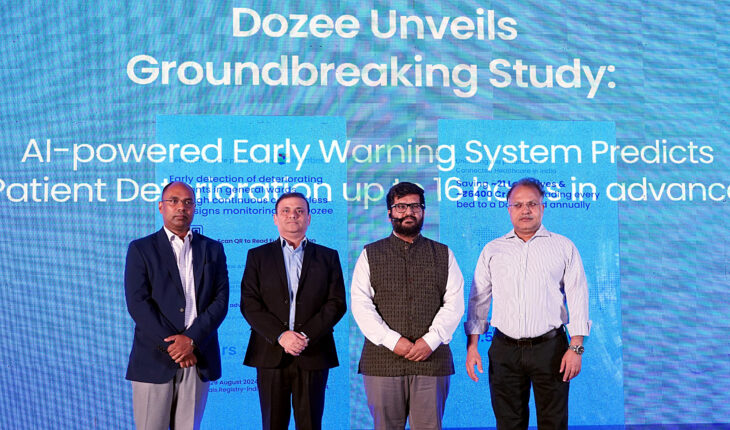Bengaluru : In a country where millions rely on manual health checks, Dozee, India’s pioneering Health AI leader, has unveiled groundbreaking research that could change the landscape of patient care. Recently published in Frontiers in Medical Technology, a prestigious international journal, this landmark study highlights the life-saving potential of Dozee’s AI-powered Early Warning System (EWS), which can predict patient deterioration up to 16 hours in advance. Conducted at King George’s Medical University (KGMU) and encompassing one of the largest observational cohorts in Indian tertiary care, the study emphasizes how this technology offers healthcare providers a critical early window to intervene, potentially saving countless lives.
In a nation with over 2 million hospital beds, where 1.9 million patients in general wards depend on infrequent spot checks, Dozee’s Continuous Contactless Remote Patient Monitoring (RPM) technology offers a scalable solution. By transforming 95% of hospital capacity with around-the-clock monitoring, Dozee ensures high-quality care at a fraction of the ICU cost. This innovation has the power to create substantial savings and increase efficiency in hospitals, saving healthcare workers approximately 2.4 hours per staff member daily.
Revolutionizing Patient Care
The study monitored over 700 patients for 85,000 hours, revealing how Dozee’s EWS could revolutionize traditional care. Its technology tracks vital signs like heart rate, respiratory rate, and blood pressure, detecting critical changes well before they become life-threatening. Dozee’s EWS system predicted patient deterioration in 67% to 94% of cases, enabling life-saving interventions long before patients’ conditions reached critical thresholds.
This capability holds the potential to save 21 lakh lives annually and reduce healthcare costs by ₹6400 crores. For hospitals stretched thin, this system offers an adaptable solution to cover large patient volumes effectively.
A Landmark Study for Indian Healthcare
This groundbreaking study, one of the largest conducted in Indian tertiary care, reaffirms Dozee’s commitment to solving the nation’s pressing healthcare challenges. By integrating Health AI into routine care, Dozee is setting a precedent for delivering scalable, affordable, and world-class healthcare to all. This innovation, which leverages the power of Health AI to predict and intervene in patient deterioration, reflects Dozee’s mission to bring quality healthcare within reach for everyone.
Global Implications and Expert Insights
Dr. Himanshu Dandu, Professor of Medicine at KGMU, remarked, “This system addresses the challenges of critical care in high-volume environments by enabling early detection. It represents a scalable solution for healthcare systems facing heavy patient loads, with the potential to enhance survival rates through timely interventions.”
On a global scale, Dr. Jean-Louis Teboul, a renowned critical care expert from Paris-Saclay University, said, “The Indian healthcare system’s strides have worldwide implications. Equitable, timely, and affordable care is a universal need, and this study demonstrates a feasible model that can resonate globally.”
Gaurav Parchani, CTO & Co-Founder of Dozee, shared his optimism, stating, “This study’s results underscore our belief that technology can revolutionize healthcare—making it more efficient, accessible, and equitable. We’re addressing an immediate need in India while laying the groundwork for healthcare worldwide.”
Authors and International Collaboration
This significant study features contributions from experts worldwide, including Dr. Himanshu Dandu and Dr. Ambuj Yadav from KGMU, Dozee’s research team, Dr. Jean-Louis Teboul, Paris-Saclay University, and Dr. Jos M. Latour, University of Plymouth, UK. This collaboration highlights that Dozee’s AI innovation isn’t just a solution for India—it’s a blueprint for global healthcare transformation.
Dozee’s AI-powered EWS demonstrates how technology can bridge gaps, offering hope for sustainable, accessible, and timely healthcare solutions. This isn’t just progress for India; it’s a model for a healthier world.






